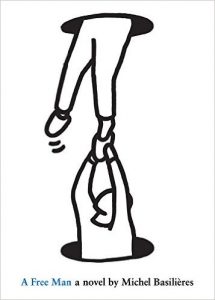
Title: A Free Man
Author: Michel Basilieres
Paperback: 216 pages; C$18.75
Publisher: ECW Press (May 1, 2015)
Language: English
Why do you read fiction?
When I read fiction, I look for two qualities: surprise and delight. Surprise: I want a story that takes me places I haven’t been before, with characters who are fully fleshed out so that their decisions can be both unexpected yet logical. Delight: reading fiction is reading for pleasure, so, not surprisingly I want it to be pleasurable. In other words, fiction should be fun.
I find what I am looking for most often in literary fiction, not genre fiction. This is partially because mainstream genre fiction (as opposed to small press or indie genre fiction) is dominated by a small number of formulae from which it rarely deviates, and not usually in interesting ways. Partially, this is because genre fiction is dominated by dark scenarios (involving space wars, apocalypses and post-apocalyptic landscapes) that, while they give a lot of people pleasure, are, for me, the opposite of fun.
That having been said, reading Michel Basilieres’ novel A Free Man reminded me that some literary fiction is also beholden to the genre’s formulae, which makes them somewhat less than delightful to read.
The basic plot involves a character, Skid Roe, who is approached by a robot from the future who needs Skid to go forward with him in the hope that Skid can help him repopulate the earth with humans after economic and ecological collapse makes us nearly extinct. Although describing the plot this way makes it sound interesting, most of the story involves Skid’s lust in the present for co-worker NaNa.
As I was reading A Free Man, I ticked off a checklist of literary fiction tropes in my head:
- embarrassing explicit sex: Skid desperately wants to make it with NaNa, taking Viagra before they do it, which gives him a painful erection which he cannot do much with since he is taking anti-depressant drugs that make him unable to ejaculate
- drug use: Skid and the narrator are constantly smoking pot
- cultural references: the robot’s name is Lem (after Polish SF writer and cyberneticist Stanislaw Lem), and one the customers at the bookstore where Skid works is named Strugatsky (after a pair of Russian SF writers)
- self-reference: Skid is telling his story to a character named Michel, who claims he needs to interrupt the writing of his second novel to get the incredible story that his friend has told him down on paper (wink wink)
- formalistic experimentation: Basilieres periodically interrupts Skid’s narrative with footnotes.
- philosophy: starting at about the mid-point of the novel, Skid and Lem periodically discuss the nature of reality, focusing on the question of free will (the robot doesn’t believe it exists, Skid hopes it does)
Sometimes, the tropes aren’t used all that well. The footnotes, for example, mostly interrupt Skid’s story to tell us something about Skid telling his story to Michel (for example: when Skid is smoking a joint in his story, Michel stops him so that they can share a joint). As such, they don’t really add anything to the narrative (unlike Vladimir Nabokov’s Pale Fire, in which the footnotes – which make up two thirds of the book – give a counter-narrative to the poem they are supposed to be commenting upon). It doesn’t help that a couple of long footnotes at the end of the novel take up Skid’s story, since that just breaks the pattern of what the footnotes represented that had been established up to that point.
Or, to use another example: the point of having Michel tell the story as Skid told it to him is meant to add uncertainty to the narrative, inasmuch as there are two untrustworthy narrators rather than one. However, Michel’s participation in the process of telling the story is so minor that he doesn’t add enough to make this work (despite the fact that, in an afterward, he explicitly tells us that we shouldn’t trust him because he may have forgotten some parts of the story or embellished others). This trope was handled much better in Mark Danielewski’s superb House of Leaves, which involved at least four levels of narration in multiple media.
Sometimes, the tropes themselves just make no sense. I suppose that it is possible for somebody who is constantly high to be able to philosophize grandiloquently, but I’ve never seen it. In my experience, people who are high think they’re being profound when, in fact, they are being silly (or making no sense whatsoever), or they just giggle without the need to talk.
There are other problems with the novel, especially with its science fiction elements. For example, as a condition of helping Lem, Skid insists that he be taken two weeks back in time (so he can try and make things right with NaNa before he screws them up). Of course, he almost immediately meets himself in the past, but, after a humourous scene where he has to explain his duplicate to his co-workers, the past Skid disappears from the narrative without explanation.
What the hell?
Skid eventually agrees to go to the future, where, he claims, he spent ten years. His experience there (including partaking in regular orgies and, improbably, starting a movement among the humans to travel out of their pens to see major cities), is recounted in a few pages. It was the worst kind of telling without showing. If Basilieres’ intention was truly satirical, he could have expanded substantially on this section, drawing a terrible future to warn us about its seeds in the present. My impression is that he isn’t committed to the speculative aspect of his narrative; instead, as previously mentioned, the vast majority of the story is about Skid’s relationship in the present with NaNa.
A Free Man totally did not work for me, but it was a reminder that literary fiction can be just as bound by its tropes – to its detriment – as genre fiction.










Good piece Ira. I don’t know this book, but you’re right about literary fiction having its tropes. And I don’t much like the distinction between “literary” and genre fiction anyway.